Dentures
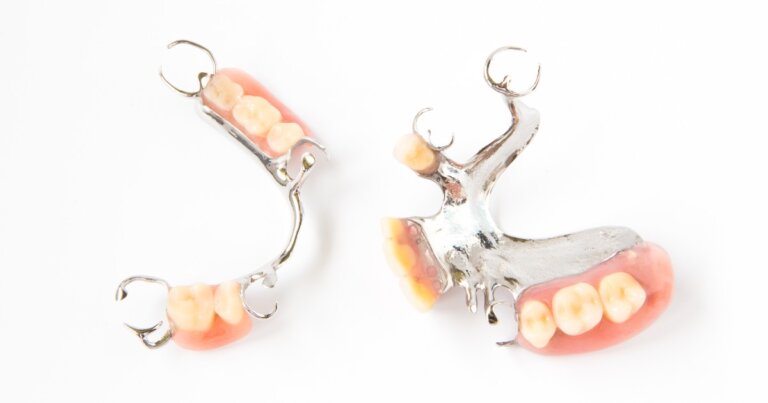
What Are Dentures?
Dentures are removable oral appliances designed to replace missing teeth and surrounding tissues. They are custom-made to fit comfortably in your mouth and replicate the appearance of natural teeth. Not only do they enhance your smile, but they also play a crucial role in supporting facial muscles, preventing sagging, and improving speech and chewing abilities.
These dental prosthetics have come a long way since their inception, and today, there are various types of dentures available to cater to different needs and preferences. Whether you’re missing a few teeth or require a full set, dentures can offer a remarkable solution to reclaim your oral well-being and self-assurance.
Before you deciding on whether Dentures are right for you, there are some things you should know:
- Who Needs Dentures?
- Benefits Of Dentures
- Types Of Dentures
- How Much Do Dentures Cost?
- Steps In The Denture Procedure
- Frequently Asked Questions About Dentures
If you have any further questions about Dentures or other dental services offered at Atlas Dental, please contact us.

Free Phone Consultation
Have questions about cosmetic dentures for missing teeth? Book a free phone consult with our Toronto dentist

5 star google reviews
Our patients love their cosmetic looking denture smile! See for yourself why patients choose Atlas Dental.

Book a denture appointment online
We make custom fitted dentures to help our patients smile confidently again.
Who Needs Dentures?
Dentures are suitable for individuals experiencing tooth loss due to a variety of reasons, including:
- Advanced Tooth Decay: Severe, untreated decay can result in tooth loss. Dentures may be recommended when teeth cannot be restored through fillings or root canal treatments.
- Gum Disease: Periodontal disease can lead to gum recession and tooth loss. Dentures offer a solution to restore both function and appearance.
- Accidents or Trauma: Injuries to the mouth can cause tooth loss, and dentures can effectively replace missing teeth.
- Aging: As we age, natural wear on teeth and gums can lead to tooth loss. Seniors commonly use dentures to replace missing teeth and maintain oral health.
- Congenitally Missing Teeth: Individuals born with missing or malformed teeth can use dentures to fill gaps and improve speech and chewing.
- Medical Conditions: Certain medical treatments, such as cancer-related dental extractions, may necessitate dentures.
- Cost-Effective Option: For individuals who cannot afford dental implants or bridges, dentures provide an economical alternative.
It’s important to note that not all cases of missing teeth require dentures. Depending on your oral health and preferences, dental implants or bridges may be recommended. If you have further questions about Dentures, please contact us.
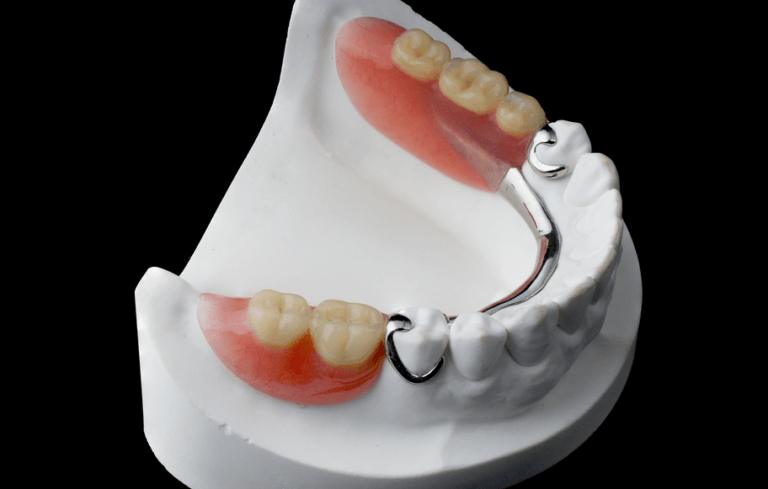
Benefits Of Dentures
Dentures offer numerous benefits beyond replacing missing teeth, including:
- Improved Chewing: Dentures restore your ability to eat a wide range of foods, contributing to a healthier, balanced diet.
- Enhanced Speech: Dentures help improve speech clarity by filling gaps in your teeth, allowing you to pronounce words more easily.
- Restored Facial Structure: Dentures prevent the sunken appearance caused by missing teeth by supporting facial muscles.
- Cost-Effective: Compared to dental implants, dentures are a more affordable tooth replacement option.
- Versatility: With various types of dentures available, they can address partial or complete tooth loss.
- Non-Invasive: Unlike dental implants, dentures do not require surgery, making them a less invasive option.
- Customizable: Dentures are made to match the shape, color, and size of your natural teeth for a natural-looking smile.
- Easy to Maintain: With proper cleaning and care, dentures are easy to maintain.
- Quick Results: Dentures can often be fitted immediately after tooth extractions, restoring function and appearance without a long wait.
- Prevents Further Tooth Loss: Dentures help maintain the position of remaining teeth, preventing further dental issues.
While dentures provide many advantages, they require regular care and maintenance for long-lasting comfort and functionality. If you have further questions about Dentures, please contact us.
Types Of Dentures
Dentures come in several types, each designed to address specific dental needs and preferences. The main types of dentures include: Complete Dentures, Partial Dentures, and Implant-Supported Dentures:
Complete Dentures
These are full sets of artificial teeth that replace all teeth in the upper or lower jaw.
- Traditional Complete Dentures, also known as full dentures, are made for patients who already do not have any teeth.
- Immediate Dentures are a type of complete denture provided right after tooth extraction to maintain functionality during the healing process.
- Tooth Supported Overdenture uses remaining natural teeth as anchors for better stability.
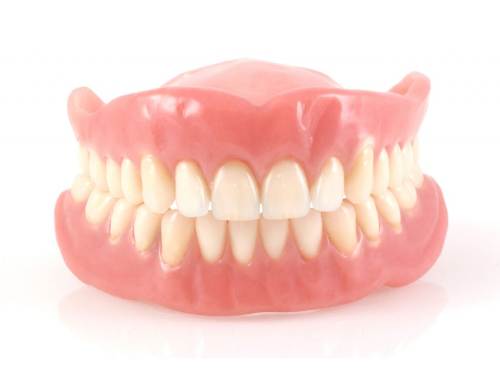
Partial Dentures
Partial Dentures are for individuals with some remaining natural teeth. They replace missing teeth while preserving natural ones. Options include:
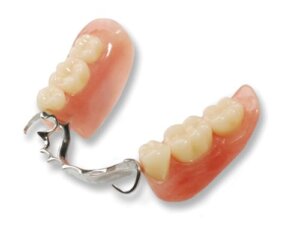
Implant Dentures
Implant-Supported Dentures are secured using dental implants, offering enhanced stability and preventing movement while eating or speaking. All-on-4 or Teeth-in-a-day treatment is one type of full mouth reconstruction procedure that involves dental implant-supported dentures.
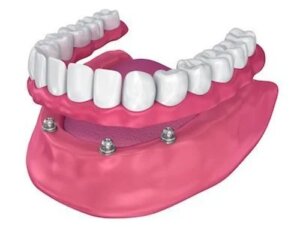
Your dentist can help you determine the most suitable type of denture based on your unique needs and preferences. If you have further questions about Dentures, please contact us.
Cost of Dentures
Dentures can range in cost from $474 to 2053 plus dental lab fee, depending on the type of denture. Example of denture codes found in the Ontario Dental Association’s Suggested Fee Guide appear as follows:
Dentures, Complete, Standard (e.g. Complete Denture)
- 51101 – Maxillary: $1142 + Dental Lab Fee
- 51102 – Mandibular: $1454 + Dental Lab Fee
Dentures, Complete, Provisional (e.g. Immediate Complete Denture)
- 51601 – Maxillary: $591 + Dental Lab Fee
- 51602 – Mandibular: $789 + Dental Lab Fee
Dentures, Complete, Overdentures, Tissue Borne, Supported by Natural Teeth (e.g. Tooth Supported Overdenture)
- 51711 – Maxillary: $1669 + Dental Lab Fee
- 51712 – Mandibular: $2053 + Dental Lab Fee
Dentures, Complete, Overdentures, Tissue Borne, Supported by Implants (e.g. Implant Denture; cost of dental implants not included)
- 51721 – Maxillary: $1669 + Dental Lab Fee
- 51722 – Mandibular: $2053 + Dental Lab Fee
Dentures, Partial, Acrylic Base (Provisional). (e.g. Single Tooth Dentures, Essix Dentures)
- 52101 – Maxillary: $474 + Dental Lab Fee
- 52102 – Mandibular: $474 + Dental Lab Fee
Dentures, Partial, Polymer, Resilient Retainer. (e.g. Valplast Flexible Partial Dentures)
- 52201 – Maxillary: $695 + Dental Lab Fee
- 52202 – Mandibular: $695 + Dental Lab Fee
Dentures, Partial, Acrylic, With Metal Wrought/Cast Clasps and/or Rests. (e.g. Acrylic Partial Dentures)
- 52301 – Maxillary: $794 + Dental Lab Fee
- 52302 – Mandibular: $794 + Dental Lab Fee
Dentures, Partial, Cast Metal Frame/Connector, Clasps and Rests. (e.g. Cast partial Dentures)
- 53101 – Maxillary: $1454 + Dental Lab Fee
- 53102 – Mandibular: $1454 + Dental Lab Fee
Dentures are sometimes considered a supplementary service by dental insurance plans and may or may not be covered by your dental insurance. Be sure to find out from your dental insurance plan provider how much you are eligible for before going ahead with dental treatment. Your dentist can help you submit an predetermination to your dental insurance. Our fees are consistent with the ODA Fee Guide.
For patients without dental insurance, Atlas Dental is pleased to offer dental financing through iFinance Dentalcard. Affordable payment plans start at 7.95% for terms of 6 months to 6 years. To learn more about Dentalcard dental treatment financing, follow this link.
Steps In The Denture Procedure
The process of getting dentures typically involves several steps:
- Initial Consultation: A thorough examination and discussion of your dental needs.
- Treatment Planning: A tailored treatment plan, which may include extractions if necessary.
- Impressions: Molds of your mouth are taken to ensure a custom fit.
- Fabrication: A dental lab creates your dentures based on your impressions.
- Try-In: A trial fitting to make adjustments as needed.
- Final Fitting: Your custom dentures are placed and adjusted for optimal fit.
- Post-Placement Care: Regular check-ups ensure comfort and long-term function.
It’s essential to follow the dentist’s instructions and attend regular check-ups to ensure that your dentures remain in good condition and continue to meet your oral health needs. If you have further questions about Dentures, please contact us.
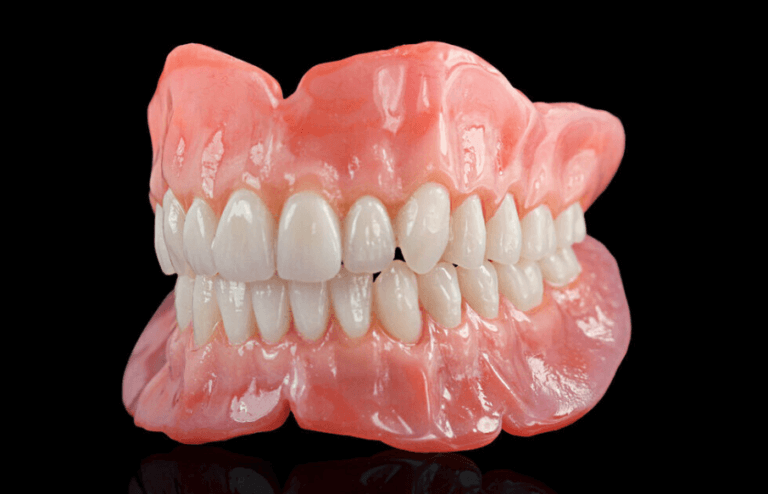
Frequently Asked Questions About Dentures
- How long do dentures typically last?
With proper care, dentures can last between 5 to 10 years. However, over time, they may need adjustments, relining, or replacement due to normal wear and changes in the mouth’s structure.
- How should I care for my dentures?
Proper denture care includes daily cleaning with a soft-bristled brush and non-abrasive cleanser, soaking them overnight in a denture solution, and maintaining good oral hygiene for any remaining natural teeth and gums. Please refer to our denture home care instructions.
- Can I sleep with my dentures in?
It’s generally recommended to remove dentures at night to allow your gums to rest and to prevent potential infections or sores.
- Will dentures affect my ability to eat and speak?
Initially, you may experience some difficulty eating and speaking. However, with practice and proper adjustment, most individuals adapt well to dentures and regain normal function.
Complete dentures are a reliable option for restoring full oral function and aesthetics when all natural teeth are missing in a dental arch. If you have further questions about Dentures, please contact us.

